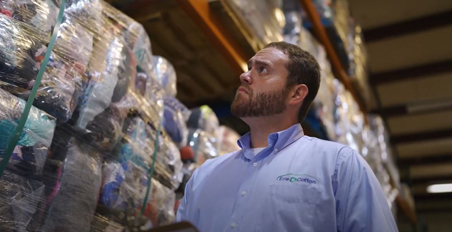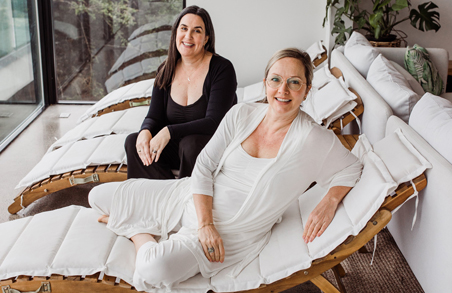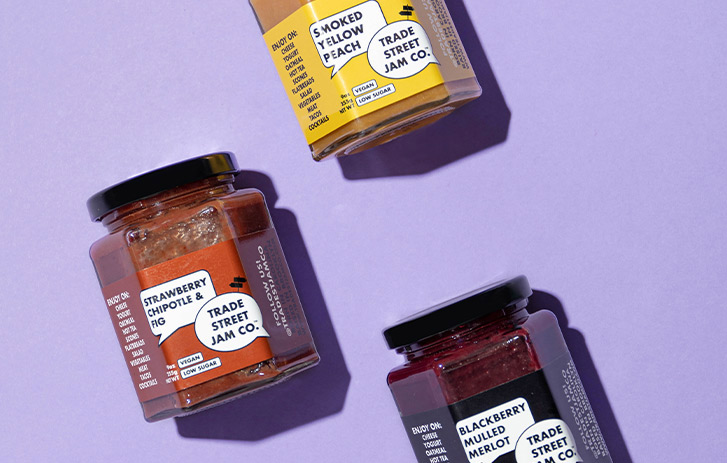Black-owned businesses thriving and inspiring
August is National Black Business Month, but insights from three Black-owned businesses—Browndages, Greentop Gifts, and Trade Street Jam Co.—can be helpful throughout the year.
We talked to these winners of the 2021 FedEx Small Business Grant program about their strategies and tips for success, and how they’re creating new growth and possibilities for themselves, their communities, and the world.
Find a need and fill it
Each of the small business owners we talked with are filling a void in the market with a unique product. Trade Street Jam Co. founder Ashley Rouse saw a desire for fruit-forward, low-sugar jams that are so versatile they can be used in cocktails, salad dressings, BBQ sauces, marinades, pan sauces, and more. “I love the idea of being able to preserve something now, and then enjoy it later, especially in a season where you can't find that produce,” she explains.
Each of the small business owners we talked with are filling a void in the market with a unique product. Trade Street Jam Co. founder Ashley Rouse saw a desire for fruit-forward, low-sugar jams that are so versatile they can be used in cocktails, salad dressings, BBQ sauces, marinades, pan sauces, and more. “I love the idea of being able to preserve something now, and then enjoy it later, especially in a season where you can't find that produce,” she explains.
The fact that her jams are both delicious and healthy makes her product stand out. “It’s a trend right now,” she says. “When you're creating a product, it has to be something that the world is looking for, the demand has to be there. And that healthy, clean-label trend is here to stay.”
For Jackie Rodgers, CEO of Greentop Gifts, the idea behind her business came from wrapping her son’s Christmas gifts. She explains, “I really wanted wrapping paper that featured brown Santas and I couldn’t find it anywhere. I started Greentop Gifts because I really wanted items that reflected our culture and looked like me and looked like my son.”
Jackie reached out to friends in Chicago, Atlanta, D.C., and Detroit to find the kind of wrapping paper she was looking for and came up empty-handed. “I told my husband that if I couldn’t find any wrapping paper by next Christmas that I was going to make my own,” she says. And that’s how their first character, Clarence Claus, was born. “I know a lot of other parents and other moms want those items…we wanted to come up with creative, magical items that can be a part of every family celebration.”
“We started Browndages after realizing that the ‘flesh-toned’ bandages that other companies offered didn't match the flesh of any of the members of our household.”
Similarly, Intisar Bashir and her husband, Rashid Mahdi, saw a lack of inclusion in the marketplace and wanted to do something about it. Says Intisar, “We started Browndages after realizing that the ‘flesh-toned’ bandages that other companies offered didn't match the flesh of any of the members of our household.” Browndages features bandages in five shades of brown. “Until we started researching to bring our company to market, I had never heard of anything like this.”
When a big-name competitor announced in June of 2020 that they were launching a line of bandages with more inclusive skin tones, the couple learned what a powerful following they already had. ”That actually helped us out a lot,” says Rashid. “Because all our supporters got on social media, saying, ‘There's already a company that does it.’ And we completely sold out.”
“We sold out of six months’ worth of inventory in six days,” Intisar adds.
When a big-name competitor announced in June of 2020 that they were launching a line of bandages with more inclusive skin tones, the couple learned what a powerful following they already had. ”That actually helped us out a lot,” says Rashid. “Because all our supporters got on social media, saying, ‘There's already a company that does it.’ And we completely sold out.”
“We sold out of six months’ worth of inventory in six days,” Intisar adds.
What also sets them apart is a children’s line that features illustrations of kids as a chef, astronaut, veterinarian, ballerina, pilot, and judge. Explains Intisar, “Our own kids were getting to the point where they wanted the bandages that had images on them. There were only princesses and superheroes and animals, that kind of stuff. So we created some with images of children that look like them—and as professionals that they could actually aspire to become.”
“Growing up I didn’t have a clue what entrepreneurship could be and I really want to show children there are opportunities and they can make a difference.”
Stay true to your passion
An unswerving belief in their product or service and a mission beyond monetary success are what drive many entrepreneurs—and keep them going during struggles and setbacks. Ashley Rouse’s background as a chef and her passion for “all things food” is apparent in every jar of her vegan, small-batch jams. She loves to pair the unexpected and create innovative flavor fusions like Plum & Rose, Smoked Yellow Peach, and Blackberry Mulled Merlot. “I wanted to play with funky flavors and just really blend things together that people didn’t expect,” she says.
“Health is really important to me as well,” says Ashley. “The majority of Americans are overweight, and the Black community has the highest rate of diabetes. Being a Black woman, I don’t want to create something that adds to that problem. We can't all have a big impact on the world, but if we can each do our part, it's really important.”
Ashley shares her story and expertise freely on social media platforms, and, pre-COVID, she taught jam classes to marginalized children. “They need to see what a young Black entrepreneur looks like,” she says. “Growing up I didn’t have a clue what entrepreneurship could be and I really want to show them there are opportunities and they can make a difference.”
The ideas of inclusivity and being a positive force in the world are also a big part of why both Browndages and Greentop Gifts created their products. Jackie’s husband Shaun notes, “Greentop Gifts creates products for underserved demographics—we’re serving a community of people who didn't see themselves in retail.”
Says Intisar, “As a Black family that has Black children, inclusivity is a topic that is close to home for us. To be able to bring the issue to light for other people is important. At the end of the day, representation really, really matters. And for us to be able to have a business that allows our children to see products that reflect them is one of our driving forces.”
Think big and prepare for growth
Getting a small business off the ground can involve rejections, setbacks, and challenges. But, as Ashley of Trade Street Jam Co. emphasized, it’s important not to let success take you by surprise.
“The pandemic was actually good for us, as far as business, because people were home,” she says. “They were looking to cook different things than normal, they were more open to buying gourmet food products…our business blew up. It was so great, but our supply chain had to keep up.”
Ashley says her focus has always been on preparing for growth: “We were fulfilling out of our apartment, with a jam factory in our lower level. My husband's like, ‘You need to move to a shared kitchen.’ I’m like, ‘Yeah, right. How can we afford that?’ But I started doing research. A few months later we were in a shared kitchen. And again, my husband said, ‘You’ve got to move to a co-packer.’ Six months later we had a manufacturer. That’s the energy you want to bring to your business: growth is going to come.”
Ashley says her focus has always been on preparing for growth: “We were fulfilling out of our apartment, with a jam factory in our lower level. My husband's like, ‘You need to move to a shared kitchen.’ I’m like, ‘Yeah, right. How can we afford that?’ But I started doing research. A few months later we were in a shared kitchen. And again, my husband said, ‘You’ve got to move to a co-packer.’ Six months later we had a manufacturer. That’s the energy you want to bring to your business: growth is going to come.”
Greentop Gifts has already grown their offerings—what started as two different styles of wrapping paper now includes seven designs plus coffee mugs, ornaments, throw blankets, and new products for birthdays and graduations. In 2020, their holiday pajamas were worn on CBS This Morning, ESPN’s Get Up, and The Rachael Ray Show—helping to make them the most successful Greentop Gifts product yet.
“This is definitely just the start for our business,” says Jackie. “We want to continue to scale and grow. I have so many ideas and there are so many children’s products that lack diversity. We want to make Greentop a household name and for our characters to be recognized in the way a Hallmark or a Disney character is.”
With the initial success of Browndages, Intisar and Rashid have a growth plan that includes getting into schools, daycare facilities, and hospitals, and potentially even big-box stores. “The only caveat,” Rashid explains, “is that it couldn’t be an exclusive thing. We want the small mom-and-pop stores that have supported us from the beginning to be able to continue to sell our products.”
And they’re interested in expanding internationally. “There are Black and brown people all over the world, not just the U.S., and we would love to be able to fill that void.”
Network, network, network
The most successful entrepreneurs recognize what they can do by themselves…and when they need to enlist help to get to the next level.
Both Shaun and Jackie of Greentop Gifts attended HBCUs (historically Black colleges and universities), and, Shaun says, “We really leaned into those networks to get us jump-started. In fact, one of our early successful marketing campaigns was to hire students at various HBCU homecomings. We gave them T-shirts to wear and they passed out buttons to get the buzz going and build awareness about Clarence Claus. It was really successful and helped us understand that ‘We've got a business here, we've got something that people really want.’”
Networking has been important—and challenging—for Ashley of Trade Street Jam Co. “When I started this journey, I had to go out and network with other entrepreneurs, and I just hated the concept of doing it,” she admits. “But when I started doing it, it was so amazing. The community—strong Black community, woman community, founder community, there are so many people going through what you're going through who want to talk about it. I would sit with founders, and be like, ‘Look, tell me how much you're paying yourself,’ having these candid conversations. That's so important. The community is just really huge as a resource.”
For Browndages, a family friend was instrumental in starting their business. “He put us in contact with a manufacturer overseas,” says Inistar. “And so that's how we were able to get our product in hand. Without him we would probably still be fumbling through this to this day. But since he already had connections with people overseas for his business, he was able to get us in contact with a medical bandage manufacturer.”
Conferences they attended pre-COVID have served as a great way to get the word out and connect with other small businesses and Black-owned businesses. “Just the overall spirit and vibe of the events are very encouraging,” says Intisar. Adds Rashid, “One of the things I miss most is that face-to-face interaction with supporters and customers. We’ve had grown women tell us how our product has affected them, almost to the point where they're in tears. It reaffirms what we’re doing and why it’s so important.”
Advice for other Black entrepreneurs
The advice these founders offer to other Black-owned businesses is based on experience, personal perspective, and a few mistakes along the way.
“We made a pretty significant mistake in managing our business in year two,” says Shaun of Greentop Gifts. “We wanted to expand and do more apparel, and we found a company that specialized in doing fulfillment but also in producing clothing, so we said, ‘Hey, let's go with them for fulfillment.’ They were based in California, so we never actually got to see their operation.
“Almost from day one, it was a complete disaster,” he continues. “Clients were waiting up to eight weeks to get their orders. We realized we needed to do a much better job of vetting. But our business survived it…anytime you can survive, it's a really positive lesson.”
The advice these founders offer to other Black-owned businesses is based on experience, personal perspective, and a few mistakes along the way.
“We made a pretty significant mistake in managing our business in year two,” says Shaun of Greentop Gifts. “We wanted to expand and do more apparel, and we found a company that specialized in doing fulfillment but also in producing clothing, so we said, ‘Hey, let's go with them for fulfillment.’ They were based in California, so we never actually got to see their operation.
“Almost from day one, it was a complete disaster,” he continues. “Clients were waiting up to eight weeks to get their orders. We realized we needed to do a much better job of vetting. But our business survived it…anytime you can survive, it's a really positive lesson.”
“And a mistake I think a lot of entrepreneurs make is this,” says Shaun. “They compare themselves to the progress and success of other entrepreneurs. You cannot do that. The quote is, ‘Comparison is the thief of joy.’ I think that just is a no-win for an entrepreneur.”
Shaun recommends persistence even in the face of the extra hurdles that Black-owned businesses face. “We can't get discouraged with one ‘no’ or two or three...it doesn't make those ‘no’s’ right, but the circumstances are the circumstances. They’re not going to change tomorrow, so we've got to be able to find ways to work within those circumstances—and push for those circumstances to change.”
The advice from Browndages’ founders? Forge ahead. “Honestly, if you have an idea, give it your best shot,” says Rashid. “Don't be discouraged by the larger competitors out there,” adds Inistar. “Don't let that be a deterrent to you. I believe there's space for everyone. And there will be people who will support you.”
For Ashley, “Being able to pivot is just really, really huge. If you're not looking to change, you’re not going to be successful. You just have to be light on your feet and ready to be able to move, and change, and be comfortable with being uncomfortable.”
She adds, “Sometimes when I have to do work that I hate, I'm like, ‘Why do you hate this so much?’ and then I realize, ‘Oh, because I’m growing. This is me being uncomfortable because I'm growing.’ And it's actually kind of cool to look back and feel like I actually have knowledge on a topic that I had no idea about years ago.”
Related reading

Small businesses benefit from inclusivity
Discover how four businesses focused on diversity, equity, and inclusion to serve the underserved. These FedEx small business grant winners flourished
Read article
Erie Cotton's Sustainable Recycling Efforts
Erie Cotton is transforming unwanted textiles into wiping cloths. Learn about their innovative recycling and community impact.
Read Article
YALA's Sustainable Comfort Revolution
YALA delivers sustainable bamboo bedding and loungewear. Learn about their transition to direct-to-consumer sales and growth with reliable shipping.
Read Article






